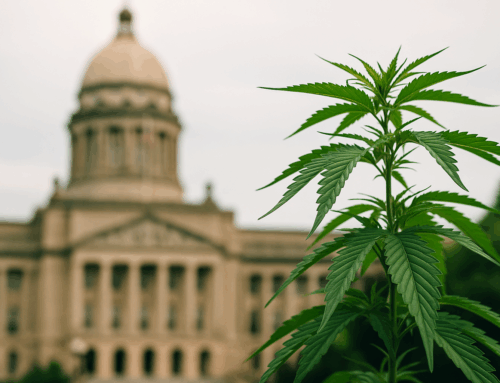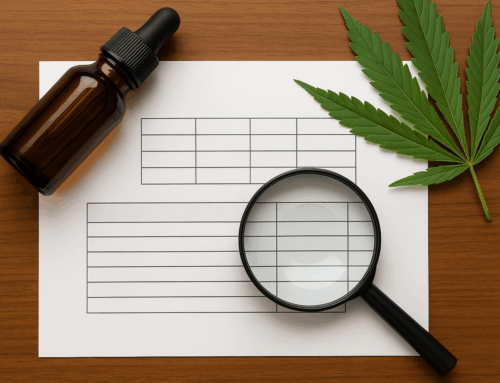People who have Irritable Bowel Syndrome(IBS) disease face many difficulties in daily life. They have to continuously deal with symptoms like pain, bloating, and unpredictable bowel movements every day. While traditional medicine can help some people, it is not a lasting fix, so many look for better options. One alternative is medical marijuana. Medical marijuana is a natural alternative option that has shown promising results in managing IBS symptoms. Moreover, Medical marijuana can provide relief from various unpleasant symptoms, thus improving the quality of life for patients suffering from this chronic condition. In this article, we will discuss how effective medical marijuana is for Irritable Bowel Syndrome Symptoms and How medical marijuana can help with Irritable Bowel Syndrome Symptoms.
Definition and Overview of IBS
Irritable Bowel Syndrome (IBS) is a long-term digestive problem that mainly affects the large intestine. It causes uncomfortable symptoms that can disrupt daily life. IBS can be distressing, it does not damage the intestines or raise the risk of more serious issues like colon cancer. Instead, IBS is a functional gastrointestinal disorder, which means the digestive system doesn’t work correctly, but there is no physical damage.
Understanding Irritable Bowel Syndrome and Its Symptoms
Irritable bowel syndrome, also known as IBS, is a long-term gastrointestinal condition that affects millions of people. It affects the stomach and intestines, which comprise the gastrointestinal tract. People who have IBS disease show common symptoms, including constipation, cramping, stomach pain, bloating, gas, diarrhea, nausea, and irregular bowel movements.
Researchers have found that psychological issues can significantly affect IBS. This is because of the direct connection between the brain and the gut, known as the gut-brain connection. Hence, this can start or worsen IBS symptoms like diarrhea and constipation.
There are treatments available that can help with IBS symptoms. Medical marijuana contains cannabinoids, mainly THC and CBD, which interact with the endocannabinoid system in the gastrointestinal tract. Therefore, some studies suggest that medical marijuana may relieve specific IBS symptoms. Medical marijuana contains cannabinoids, mainly THC and CBD, which interact with the endocannabinoid system in the gastrointestinal tract.
Common Symptoms of IBS
IBS symptoms can happen a lot or just sometimes. You might feel okay and have regular bathroom times, but the symptoms can return.
Signs and symptoms of IBS include:
- Diarrhea
- constipation
- Sensation of incomplete evacuation
- Increased gas or mucus in the stool
- Bloating
- Distention
- Cramping
- Sharp pain
- Fullness
If you have different bathroom habits that last a long time or feel sick in other ways, you should talk to a medical marijuana doctor. These signs might mean something serious, like colon cancer. Some severe signs are:
- Weight loss.
- Diarrhea at night.
- Rectal bleeding.
- Iron deficiency anemia.
- Unexplained vomiting.
- Pain that isn’t relieved by passing gas or stool.
Types of IBS
There are three main types of IBS based on the predominant bowel and movement pattern. The following are the types of IBS:
IBS with Constipation (IBS-C): If more than a quarter of your stools are hard or lumpy, and less than a quarter are loose or watery on days when your bowel movements are abnormal, this may be the sign of IBS-C.
IBS with Diarrhea (IBS-D): Abnormal bowel movements are characterized by over 25% of stools being loose or watery, while fewer than 25% are hard or lumpy.
IBS with Mixed Bowel Habits (IBS-M): You have abnormal bowel movements if more than a quarter of your stools are loose or watery and less than a quarter are hard or lumpy.
IBS Unspecified (IBS-U): Abnormal bowel movements are characterized by having more than 25% of stools that are loose or watery, while less than 25% are hard or lumpy.
The Role of Medical Marijuana in Managing IBS Symptoms
Medical marijuana has shown relief to people seeking relief from Irritable Bowel Syndrome (IBS), especially for those who haven’t gotten any improvements from traditional medicines. Many people have found relief from IBS with the help of medical marijuana, and some studies even suggest that medical marijuana could help with IBS symptoms. It’s encouraging to see more discussions around this choice! However, it’s good to remember that there isn’t yet a guarantee to support its effectiveness fully for IBS. For those interested in trying medical marijuana, visiting licensed dispensaries can be a helpful first step in obtaining the right products and guidance.”
Endocannabinoid System and IBS
The endocannabinoid system (ECS) helps control many essential jobs in our bodies, like how our tummy works and how we feel pain. People with irritable bowel syndrome (IBS) have problems with their ECS, so it might be helpful for them to get treatment. Cannabinoids are special chemicals in medical marijuana that can work with the ECS. They may improve IBS symptoms. Similarly, individuals with conditions like spastic quadriplegia may also find potential relief through cannabinoids, as they can help with managing muscle spasticity and pain, which are common symptoms of the condition
Benefits of Medical Marijuana for Treating IBS Symptoms
Pain Ease: By activating CB1 receptors in the nervous system of the brain, Cannabinoids like THC can help in reducing pain. Medical marijuana may help reduce abdominal pain, which is a primary symptom of IBS.
Decrease of Inflammation: Some studies suggest that cannabinoids might help reduce swelling in the body, which could be really helpful for folks dealing with IBS—a condition that can lead to tummy troubles and discomfort. By interacting with certain receptors in our bodies, cannabinoids have the potential to ease swelling in the gut, making things a bit more comfortable.
Regulation of Gut Motility: If you’re dealing with tummy troubles like diarrhea or constipation, medical marijuana might just be worth considering! CBD, one of the key components of marijuana, could help calm the nerves that control your stomach’s activity, potentially bringing you some much-needed relief.
Nausea Control: Some people with IBS feel sick to their stomach. THC and CBD, which come from plants, can help make them feel better by stopping the nausea.
Stress and Anxiety Decrease: Stress and worry can make IBS symptoms worse. Medical marijuana can help people feel less stressed. This means it might help with IBS symptoms, too.
How THC and CBD Work on IBS Symptoms
CBD and THC are the two main components found in marijuana.
Cannabidiol (CBD)
CBD, or cannabidiol, may help relieve symptoms of irritable bowel syndrome (IBS), such as pain and swelling. It can ease these symptoms without affecting how your brain works.
Reduces Swelling: CBD can help reduce swelling in the tummy, which makes IBS feel worse.
Helps Tummy Movement: CBD might affect the tummy’s movement, making digestion easier.
Lessens Pain: CBD can help lower pain by making specific pain signals in the body less sensitive.
Reduces Worry and Stress: CBD may help with feeling anxious or sad, improving IBS symptoms when you feel less stressed.
Tetrahydrocannabinol (THC)
THC is a substance that can make you feel high. It helps relax your stomach and can reduce pain and cramps. It may also help you feel better emotionally.
Helps with Pain: THC can make belly pain less intense, which is something people with Irritable Bowel Syndrome (IBS) often feel.
Affects How Your Stomach Moves: THC can change how your stomach works. It can help if you have diarrhea or constipation. In one study, a form of THC helped slow down stomach movement in people with diarrhea.
May Help the Gut Feel Better: THC might help the stomach feel more comfortable and relaxed.
Helps with Nausea: THC can stop you from feeling sick to your stomach.
If you can handle feeling high, THC might help with IBS more than CBD. But if you don’t want to feel high, you can use CBD instead.
Reduction of Pain and Discomfort
Medical marijuana can be a great way to ease discomfort for people suffering from diseases like IBS, chronic nausea, and muscle spasms. Components like CBD and THC found in marijuana interact with the nervous system of the brain to control pain receptors, helping to reduce pain and discomfort. Many studies show a significant growth in pain relief for IBS by using medical marijuana. It’s a natural alternative that can positively affect how we feel!
Medical marijuana is a good option for people who are struggling with regular pain and have no effect from traditional medicines. With the help of medical marijuana, they can improve their sleep and rest better. Let’s see how medical cannabis helps in pain relief and discomfort.
Reducing Muscle Spasms: Cannabinoids can be a helpful way to ease stomach discomfort! They work like gentle muscle relaxants, which can soothe those pesky muscle spasms in the digestive tract.
Enhancing Gastrointestinal Movement: Using medical marijuana can be a great way to help manage your gut movements! It can make a big difference in easing discomfort from diarrhea and constipation, helping you feel more comfortable overall.
Minimizing Nausea and Vomiting: Medical marijuana can be a great way to help with nausea and vomiting. Many people find it also boosts their comfort and overall well-being, making them feel much better.
Reducing inflammation: Cannabinoids can help relieve gut discomfort by reducing inflammation. This means less swelling and irritation, making overall a more comfortable feeling.
Improvement of Psychological Symptoms
Medical marijuana might help people with Irritable Bowel Syndrome (IBS) feel better. As we know, our nerves are directly connected from the brain to the gut. Medical marijuana, especially a type called CBD, can make people feel less anxious and stressed. Therefore, It can help reduce feelings of worry, anxiety, depression, and sadness, which many people with IBS experience. For those considering this option, obtaining a medical marijuana card could be the first step in accessing these benefits. There has been significant growth in the number of people who use medical marijuana for treating psychological problems and emotional problems. Moreover, Medical marijuana might also help people who feel sad. It can boost mood and make people feel happier, which allows those with IBS.
Considerations and Risks of Using Medical Marijuana for IBS
While medical marijuana has shown promising results in managing IBS symptoms, there are some things you should know before using medical marijuana for IBS symptoms. These include potential adverse effects; as we know, there is no hard evidence that guarantees that medical marijuana helps with IBS symptoms, and it is also legal and regulatory, Additionally, some people with Ulcerative Colitis symptoms have explored medical marijuana as a potential treatment, but the effects can vary, and more research is needed to understand its role in managing these conditions.
Potential Adverse Effects
Cognitive Impairment: High use of Cannabis can affect the part of the brain used for memory and learning, known as impaired mental functions. Using medical marijuana for a long time, especially in teenagers, may change how their brains develop.
Psychiatric Issues: Cannabis can also cause psychiatric disorders, including anxiety, depression, and psychosis. People with a history of mental health issues should exercise caution and avoid the use of Cannabis.
Respiratory Problems: Consuming Cannabis directly, such as smoking, can lead to major respiratory issues such as chronic bronchitis, cough, and more dangerous diseases like cancer, similar to tobacco smoking.
Cannabinoid Hyperemesis Syndrome (CHS): Chronic cannabis use can paradoxically cause CHS, characterized by severe nausea, vomiting, and abdominal pain.
Motor Vehicle Accidents: Using Cannabis might affect your driving skills and judgment, which can increase the chances of having a road accident. It’s always best to avoid Cannabis and other products related to medical marijuana.
Dependence and Addiction: It’s essential to keep in mind that using Cannabis regularly can sometimes lead to dependence and addiction. There’s been a noticeable increase in related mental health challenges for some individuals, which is known as Cannabis Use Disorder.
Gastrointestinal Issues: Some studies suggest that people who use Cannabis might have a slightly higher chance of being hospitalized for IBS.
Possible Side Effects
Marijuana use can cause a range of side effects, both short-term and long-term, that affect physical and mental health. These side effects can vary depending on the individual, the dosage, and the method of consumption.
Short-Term Side Effects:
- Cognitive and mental effects:
- Altered senses (e.g., brighter colors)
- Euphoria
- Confusion
- Disorientation
- Short-term memory loss
- Impaired thinking, concentration, and coordination
- Hallucinations or delusions (with high doses)
- Physical effects:
- Dry mouth
- Increased appetite
- Nausea
- Increased heart rate
- Dizziness
- Lightheadedness
- Slower reaction times
- Other effects:
- Anxiety
- Relaxation
- Sleepiness
Long-Term Side Effects:
- Cognitive and mental health:
- Negative impacts on attention, learning, and memory
- Worsening symptoms of depression
- Increased risk of depression and psychosis (in people with schizophrenia)
- Physical health:
- Lung damage
- Increased risk of stroke, heart disease, and blood vessel disease
- Respiratory difficulties
- Frequent, severe vomiting (with high-dose THC use)
- Pregnancy-related risks:
- Negative impact on fetal brain development
- Increased risk of stillbirth, premature birth, and low birth weight
- THC present in breast milk, potentially harming infant development
- Addiction:
- Cannabis use disorder, especially in adolescents
- Other potential risks:
- Increased risk of testicular cancer
Conclusion: Is Medical Marijuana a Viable Option for IBS?
Marijuana may not cure IBS, but it can help manage some of its symptoms. The legality of marijuana varies by location, so be sure to check your local medical marijuana laws. It can also cause side effects like drowsiness and impaired coordination, so it’s important to use it carefully. For personalized guidance and to understand any potential drug interactions, consult Ezmedcard. Our team is here to offer expert advice personalized to your needs.
FAQs
1. What is the process for getting the cheapest medical marijuana card?
To get the cheapest medical marijuana card, research local clinics and compare their prices. Some clinics offer discounts or lower fees based on your income. Make sure the provider is legitimate and licensed in your state. The card allows you to use medical marijuana legally, so choosing a trusted source is important.
2. Can medical marijuana help with Post-Traumatic Stress Disorder (PTSD)?
Medical marijuana can help manage symptoms of Post-Traumatic Stress Disorder (PTSD). Many patients find relief from anxiety, stress, and trouble sleeping with cannabis. Research has looked at both THC and CBD for their ability to reduce PTSD symptoms. As a result, medical marijuana is becoming a more recognized treatment option for PTSD.
3. How can medical marijuana help with spinal cord injuries?
Medical marijuana is being studied as a possible treatment for people with spinal cord injuries. It may help manage chronic pain and reduce muscle spasticity. Cannabinoids, such as THC and CBD, might provide relief from discomfort and improve mobility for some patients. More research is needed, but medical marijuana could be a useful addition to their therapy.
4. What is Delta-8, and how does it differ from Delta-9 THC?w33w
Delta-8 THC is a compound found in cannabis that is similar to Delta-9 THC, the substance that causes the "high" from marijuana. Delta-8 is generally considered to be less strong, and users often report milder effects. Many people are interested in Delta-8 because it may offer relief without the intense high that Delta-9 can produce. This makes it a popular option for some medical marijuana users.
5. Is medical marijuana an effective treatment for Sickle Cell Anemia?
Medical marijuana has shown potential in alleviating some of the symptoms associated with Sickle Cell Anemia, such as pain and inflammation. Many patients use medical marijuana to manage chronic pain crises that are common with the condition. While more research is needed, Medical Marijuana for Sickle Cell Anemia is being explored for its ability to improve quality of life for patients experiencing frequent pain episodes.





